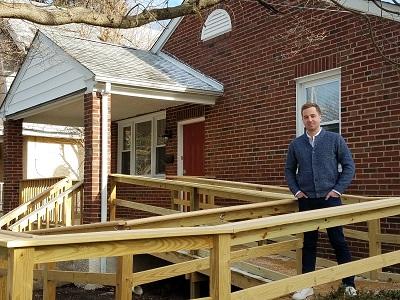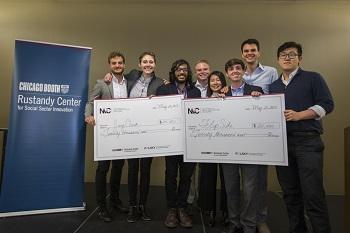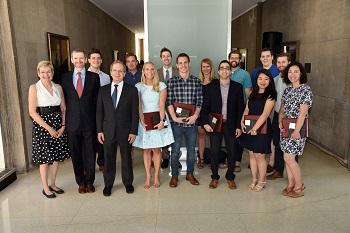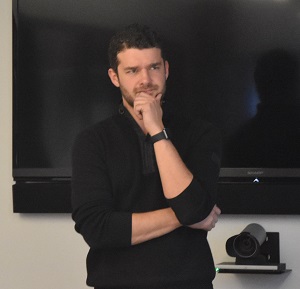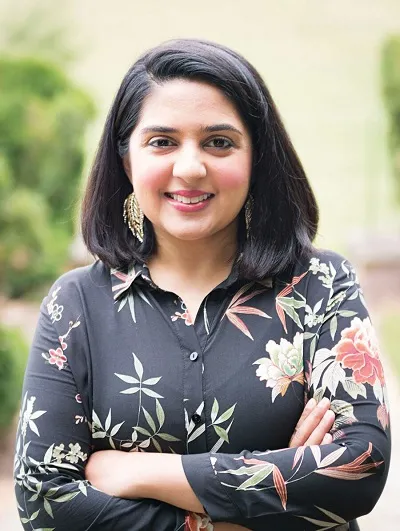Inside the Law School's Expanding Commitment to Business and Innovation
Last year, Andrew Parker, ’17, raised $10 million to launch a property company that acquires, renovates, and then leases and maintains housing communities for adults with disabilities. He secured development and management deals with eight nonprofit care providers in four states and struck an affordable loan agreement with a bank that structures debt specifically for these types of projects. He also received his JD with a certificate from the Law School’s Doctoroff Business Leadership Program, passed the Illinois bar exam, and set up shop in the windowless, 7-by-10-foot office he rents in a billboard factory in Chicago’s Bucktown neighborhood.
It was a whirlwind year, and every part mattered. Although Parker doesn’t practice law, his Law School experience played a particularly important role, equipping him with the ability to understand contracts and legal requirements, connecting him with influential mentors and advisors, and arming him with the analytical skills to execute a complex strategic mission.
“Starting a business means making a thousand small decisions in a row, and you can do it by making gut-feel decisions each time—or you can use an overarching framework to make those decisions with a strategic end goal in mind,” said Parker, who runs Nestidd, LLC, with Tad Ritter, an undergraduate classmate who now lives in Columbus, Ohio. “The Law School taught me to use the framework, and that has made the process of starting a business a little less overwhelming. I don’t have to battle with myself about every little decision. And if I have 20 steps and step two is a problem, I’m more likely to know that at step three, not at step 17. I’ve been able to analyze things more honestly and objectively because of my time at the Law School.”
Entrepreneurs historically have represented a small fraction of the Law School’s students and alumni, but the speed and sprawl of innovation, a legal market that has shifted in response to the changing economy, and regulatory complexities that make lawyers particularly well suited to the startup space have sparked a growing interest in entrepreneurship among Law School students—with some launching ventures before graduation. The Law School’s commitment to business and innovation has expanded in recent years, too, giving students opportunities to develop key skills and plug in to the growing array of resources around campus. Students can participate in the selective Doctoroff Program, which weaves a core MBA curriculum, internships, mentorships, and enrichment opportunities into the three-year JD program; the Innovation Clinic, which gives students the chance to counsel startups and venture capital funds; and cross-campus opportunities with the University’s Polsky Center for Entrepreneurship and Innovation and the Booth School of Business’s Rustandy Center for Social Sector Innovation. They can take classes like Coding in the Law, Corporate and Entrepreneurial Finance, and the Legal Challenges of Early-Stage Companies, and get advice from professors and alumni with entrepreneurial experience. The Institute for Justice Clinic on Entrepreneurship (IJ), which celebrates its 20th anniversary this year, offers a complementary vantage point, training law students to advocate for low-income entrepreneurs in Chicago—many of whom, like high-tech startups, face regulatory hurdles.
“Technology is moving at a breakneck pace, and ultimately, we’re trying to build lawyers who can help define the contours of this new reality,” said Assistant Clinical Professor Salen Churi, the Bluhm-Helfand Director of the Innovation Clinic and a former associate director in the IJ clinic. “Innovation is an exciting topic for people—it gives you the opportunity to build something out of nothing. And the Law School attracts students who are serious about intellectual inquiry and who want to take on big issues and change the world. Technology is a way to do that.”
In the past two years, Law School students have placed among the top finishers in the John Edwardson, ’72, Social New Venture Challenge (SNVC), a campus-wide competition organized by the Rustandy Center in partnership with the Polsky Center. Last year, two Law School–affiliated teams tied for second place: an interdisciplinary team that includes Michael Killingsworth, ’18, won for Flipside, a platform that combines social science research and computer algorithms to help users escape so-called filter bubbles, and Kate Miller, ’17, and Christian Kolb, LLM ’17, won for JuryCheck, a web-based data repository that allows attorneys, advocates, and courts to detect racial and gender underrepresentation in jury pools. The year before, an all–Law School team tied for first place with AccessArc, a technology service they developed to give prison inmates increased access to legal advocacy. Each of the three teams received $20,000 in startup funding.
“In today’s technology-driven economy, there are layers of complexity: regulatory issues, new patents, existing industries pushing back on new competition—all of these dimensions are moving parts that lawyers are particularly well equipped to evaluate,” said Robin Ross, the executive director of the Doctoroff Program. “The JD is, in many ways, the Swiss army knife of graduate degrees. Our graduates are prepared to engage in all aspects of the high-tech startup world: as legal advisors, CEOs, COOs, in venture capital—and as founders themselves. In particular, this generation has a high degree of interest in social entrepreneurship. Many of them see problems they want to solve.”
Lawyers, of course, aren’t new to either problem solving or entrepreneurship—and the Law School has a long history of producing top business leaders and company founders. But as technology continues to transform the economy, the advantages of JD thinking may become even more apparent, Ross and others said.
“Law school teaches us to look at all the downsides,” said Law School Lecturer Michael Kennedy, ’90, a lawyer and entrepreneur who in 2009 began teaching what is now called The Legal Challenges of Early-Stage Companies: The Lawyer as an Entrepreneur. “In the first year of law school, students take Torts and they take Property, and they see where things can go awry. Law school essentially teaches the negative side of entrepreneurship, which is beneficial because you go in eyes wide open. Lawyers are also good at challenging assumptions. People at the business school talk about business models and what the business is, whereas at the Law School we’re talking about risk and structure, and that really helps bridge a gap.”
Kennedy, who regularly advises startups, has mentored Law School students like Killingsworth, often focusing on the value of worst-case-scenario thinking while also urging them to keep it in check.
“You have to be careful not to stifle the energy and creativity,” he said. “That’s the delicate balance that I try to walk—I figure out which side of the coin they’re on and try to walk them more to the other side.”
Growing Support for Innovation
Both the Doctoroff Program, which began in 2013, and the Innovation Clinic, which launched in 2015, reflect a growing focus on entrepreneurship and innovation not just at the Law School but throughout the University. (In addition to training future and current entrepreneurs, both the Doctoroff Program and the Innovation Clinic prepare students for other roles, including as legal advisors, venture associates, and business leaders.) In 2016, University Trustee Michael Polsky made a new gift of $35 million—his third since 2002, bringing his total commitment to $50 million—to expand the Polsky Center and unite University resources in venture creation. The center’s resources include a 34,000-square-foot, multidisciplinary coworking space called the Polsky Exchange; a $20 million Innovation Fund that invests in early-stage ventures; and a state-of-the-art Fabrication Lab for prototyping new products.
The Polsky Center has been a resource for Law School entrepreneurs—Killingsworth, for instance, has attended networking events, and his team has taken advantage of the coworking space at the Polsky Exchange. Innovation Clinic and Doctoroff students help evaluate potential investments as venture associates at the center’s Innovation Fund, and they work on legal documents and present workshops on legal issues for entrepreneurs at the Exchange. They have also created legal and business frameworks for community engagement programming at the Polsky Center, such as the Fab Lab and the Polsky Small Business Growth Program.
“We have an unbelievable slate of assets here at the University,” Churi said. “A lot of my thinking in structuring the clinic was, ‘How do we leverage that?’ We built this clinic to plug directly in to those [assets] and to find the right kinds of mutually beneficial relationships with our cross-campus collaborators. The response has been incredibly positive, and as those programs have continued to take off and grow, it has been a boon for us.”
The Innovation Clinic has also forged relationships with a variety of new companies, giving students additional opportunities to work on the sorts of legal issues that can emerge when a new idea enters the marketplace or a company expands rapidly.
“More and more you’re seeing these collision points between innovation and regulation,” Churi said. “And this shifting landscape has put our clinic on unique footing nationwide—we’re the only ones that have really focused on this from a regulatory perspective with high-growth startups.”
In the two-and-a-half years since its launch, demand for the Innovation Clinic has remained high; it has consistently boasted a waiting list almost as big as the clinic itself, which typically serves about a dozen students per quarter. And although the majority of its students have sought work advising startups as opposed to founding ventures themselves, the work gives them the connections and experience they’ll need if and when they decide to become founders themselves.
“Already we’ve had multiple students who have been offered summer and permanent positions at venture capital firms—and those are notoriously difficult jobs to get,” Churi said. “We’ve had students who go to startups and intern after their summer law firm internships, sometimes serving as the only regulatory set of eyes. A lot of these startups can’t afford a full-time general counsel, and so these students . . . get to be the first line of defense. For students who want to jump into an entrepreneurial enterprise, there just are unbelievable opportunities.”
For those who enter entrepreneurial enterprises as founders, there are a variety of ways to go about it. A very few, like Parker, focus solely on their enterprise after graduation, while others roll out an entrepreneurial project alongside a salaried job or fellowship. JuryCheck’s Miller, for instance, has been continuing to develop the project while also working full-time as a staff attorney and postgraduate fellow at the Sargent Shriver National Center on Poverty Law, where she focuses on some of the same issues JuryCheck seeks to address. Her partner, Kolb, is currently working for a public prosecutor as part of his legal training in Germany. Their team meets weekly, usually on Sunday mornings with Kolb checking in by video chat, and they work on JuryCheck in the evenings.
“Because I work in the public interest space, and specifically work in criminal justice reform, I see every day how these systems affect people, and it is easy to want to keep working to make things more equitable,” she said.
JuryCheck, after all, was developed as a way to use technology to reduce inequities in the justice system: the platform acts as a central repository for information on jury composition, providing lawyers and advocates with a way to detect bias or imbalance. In the months since receiving their SNVC award funding, they have incorporated as a nonprofit, examined feedback from public defenders on their initial prototype, and worked to redevelop product features.
“We realized that a lot of attorneys interested in jury composition challenges are practicing in areas where the county clerks are not asking jurors about their racial/ethnic identity on their qualification surveys,” Miller said. “So [we’ve worked to update] the functionality of the app to be able to compare the addresses of jurors to county demographic information so that attorneys in these counties can also use JuryCheck.” Miller and Kolb hope to have JuryCheck ready for use in several markets later this spring.
Some students arrive at the Law School with previous entrepreneurial experience and a desire to develop the knowledge and skills to pursue a variety of paths over the course of their careers—sometimes choosing the Law School for its business-oriented offerings and interdisciplinary focus.
Soheil Ebadat, ’20, for instance, started law school with two ventures under his belt. He’d won a National Young Entrepreneur of the Year award from the National Federation of Independent Businesses as a high school student in 2012, a year after he founded a successful yard-sale management company in Houston. In college, he founded a clothing company that he sold more than a year later. When it came time to choose a graduate school—after graduating summa cum laude from Texas A&M and working for nearly two years as a management consultant at Accenture—he chose the Law School, in large part because of the Doctoroff Program.
“For me, solving problems is about critical thinking and having a diversity of perspectives to rely on—and that’s what law school is. It’s a new way of thinking,” Ebadat said. “I was drawn to the Law School’s interdisciplinary approach—you can’t apply economics and financials and solve legal questions without also understanding human history and behavioral psychology. It’s all intertwined.”
The Doctoroff Program, meanwhile, offered him the chance to combine business and law. In addition to the core business classes—each taught at the Law School by leading Booth faculty and available to all Law School students—Doctoroff students are matched with a business mentor and complete a business internship. They also take part in a variety of enrichment activities, including listening to and meeting high-profile speakers.
“The only thing I know for certain is that I want my career to end up somewhere between law and business—be it business with a flavor of law or law with a flavor of business—and Doctoroff will give me the tools and education I need to be able to hit the ground running,” he said. “It opens up a whole variety of resources and people and ideas and perspectives. At other schools, I’d miss out on all of that unless I did a dual-degree program.”
Collaboration and Connection
Parker understands that dual draw of business and law: he loves both.
Although he enjoyed working at a major law firm one summer—and gained valuable experience—the drive to innovate is somehow hardwired, a part of himself that he finds nearly impossible to ignore. Over the years, he’s attempted to launch somewhere between 15 and 20 different ventures, from a nonprofit volunteering company to a food truck park in Chicago’s Logan Square neighborhood.
“I just really like that process, despite the fact that, at first, I had zero success,” he said. “But that beginning is, in some ways, the most fun because you don’t yet see the limits. You think, ‘Why can’t I just put food trucks on this empty piece of land?’” He chuckled, then added: “This empty piece of land that’s owned by someone who doesn’t even want them there.”
Nestidd, in fact, grew from a previous real estate venture—Parker and his business partner Ritter acquired, rehabbed, and either leased or sold Chicago property throughout Parker’s time in law school. The summer before Parker’s third year, the two learned about the rapidly expanding market for residential communities for people with intellectual or developmental disabilities (i/dd)—a trend driven both by the movement away from institutional living and by life-extending medical advancements.
“A long life does not always mean a full life,” Parker said. “The federal government, states, and nonprofits generally do a fantastic job of caring for these individuals, but these entities—the care providers—are not set up with the capital, manpower, or expertise to source and operate real estate. This means that the great work they do can only reach a fraction of the i/dd population. In many states, waitlists for Medicaid waivers, which provide the type of care many individuals need to thrive, is over 20 years long.”
Parker and Ritter began to wonder: what if someone else—someone who understood the needs of the i/dd market—found the real estate, fixed it up, and then handled the management and operations? What if that someone created a company that was for-profit and therefore scalable, creating an opportunity to serve a greater number of people? What if that someone was them?
The young entrepreneurs dug in, learning all they could about i/dd real estate and industry standards, including Americans with Disabilities Act compliance and in-home technology that would help them customize homes for those with disabilities. They began meeting with nonprofit care providers. They identified their first site in Philadelphia, four group homes for recent graduates of a school for the blind, and began renovating them as proof of concept. By July, just a month after Parker graduated from the Law School, they were ready to approach potential investors. Over the course of several meetings and pitches, they raised $10 million in startup funding from a small handful of individuals and institutions. Near the end of 2017, they struck a deal with a publicly traded financial institution that was able to optimize loans for projects like theirs, giving their for-profit company access to mortgages that are typically out of reach for cash-strapped nonprofits.
“In the past, a lot of these nonprofits had had a really hard time getting mortgages—members of their boards would have to guarantee the loans or they’d have to raise the money themselves,” Parker said.
By the end of December, Nestidd had 60 homes either in the pipeline or completed. A month later, that number had more than doubled.
“Nestidd does well by doing good because it owns a solid asset with a stable, long-term tenant in place,” Parker said. “And the care provider wins because it can focus its money and time on providing care rather than owning and operating expensive real estate. It also allows the care provider to scale its impact.”
Throughout the process—and even as he worked to develop his earlier property company—Parker sought guidance from a long list of mentors, many affiliated with the Law School. Ross served as an advisor, connecting Parker with other resources and helping Nestidd refine its business model and strategic vision. The summer after his first year in law school, Parker worked for Chicago-based Evergreen Real Estate Services, learning about the affordable real estate market from its chairman, Jeff Rappin, ’66, who still offers insight and advice. Parker’s uncle, Ben Vandebunt, and his wife, Laura Fox, ’87, a third-generation Law School graduate, have been regular sounding boards and resources—and now cochair the Nestidd board of directors. Parker’s Doctoroff mentor Patricia Aluisi, the EVP and chief operating officer at MB Real Estate, has offered advice, as has Clinical Professor Jeff Leslie, the Paul J. Tierney Director of the Housing Initiative. Vandebunt and Tony Bouza, ’85, a real estate attorney and family friend, offered Parker a piece of advice that has become a guiding principle: always be sure you completely understand every document that crosses your desk. No exceptions.
“It’s a challenge, and the two of them are tough—but I wouldn’t be nearly as prepared or as detail-oriented without them,” Parker said of Bouza and Vandebunt. “I’ve learned the importance of never saying, ‘I’ll figure this out later.’”
This type of support is a key advantage, students said. Both Churi and Ross, who communicate regularly and support each other’s efforts, work hard to help students find advisors, amass the right knowledge, and gain necessary experience, regardless of which aspect of business or entrepreneurship interests them. Doctoroff Program students have taken summer internships with the Innovation Clinic. And when three members of the Class of 2016 were creating AccessArc—a product that has been put temporarily on hold while they focus on their early legal careers—they received guidance not only from Ross but from Churi’s Innovation Clinic students, who advised them on legal issues. It was a nice collaboration, Churi said later, noting that it illustrated the different ways in which a law degree can prepare one for the startup world.
Students also turn to their instructors in a wide range of other courses. When Miller and Kolb were developing JuryCheck—which began as a project in their Coding in the Law class—their instructor, Lecturer Nikhil Abraham, JD/MBA ’11, offered guidance and advice. Ross reached out and offered to help the group prepare for their SNVC pitch, and Professor William Hubbard helped make connections and talk through issues involving the market for data on the criminal justice system.
“It was just an outpouring of support,” Miller said.
Killingsworth and the rest of the interdisciplinary Flipside team—which includes undergraduate computer science majors, a former Shark Tank winner, and the former editor in chief of the Maroon—also drew on a wide variety of resources across campus. Their content curation product uses a complex algorithm to assess the political ideology and moral leanings of each user along with their language and tone preferences. It then offers them “flipside” stories—but ones written in a way that are likely to resonate. Ross offered guidance on their SNVC pitch, and Professor Geoffrey R. Stone connected the group with journalists and other experts. Kennedy, who had Killingsworth in his Legal Challenges of Early-Stage Companies class, helped the Flipside team understand the potential legal issues they might encounter. Other UChicago scholars offered insight on human behavior, politics, and their computer models. The Rustandy Center offered expert feedback and resources during the Social New Venture Challenge, and Killingsworth’s Doctoroff classes helped him to better understand business strategy.
“The University of Chicago has given me resources that I never could have imagined,” said Killingsworth, whose group has spent some of their startup funding to conduct A/B testing since launching the product last spring. “I’d just never been at a school with so many academic and business resources and so many alumni who are willing to help. They always say yes—it’s amazing.”
For Parker, all of the support and guidance meant he was able to pursue a legal education and nurture that piece of himself that longs to create.
“I am obsessed with building something that both makes money and solves a problem for others,” Parker said. “I can’t imagine anything more exciting than that. I am an entrepreneur because if I did anything else I would be miserable thinking about the fact that I could be doing this.”
